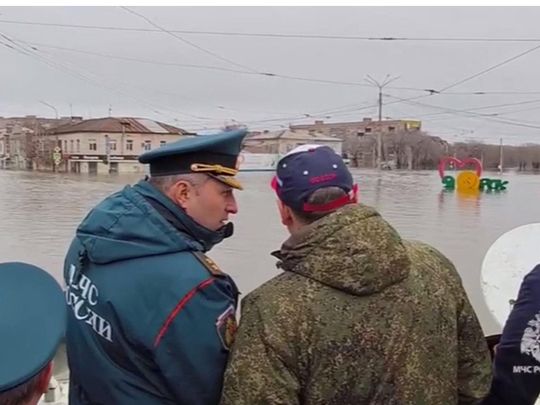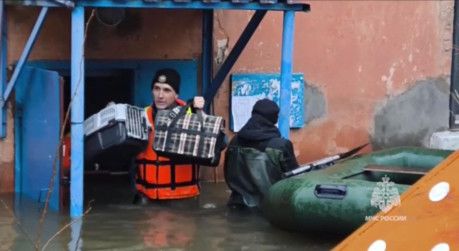
MOSCOW: A major flood in the Russian city of Orsk forced thousands of people to evacuate, with Moscow reporting a “critical” situation Sunday and warning of danger water levels in Siberia.
Russia has introduced a “federal emergency” situation in the southern Orenburg region, where the Ural river has flooded Orsk and now threatens the main city of Orenburg.
Torrential rain caused a dam near Orsk, in the southern Urals near Kazakhstan, to burst Friday night, with authorities saying more heavy rainfall will cause water levels to continue to rise.
Images showed Orsk almost entirely flooded, with only the top of submerged cars visible.
Authorities have said more than 4,500 people have been evacuated from Orsk and that more than 6,500 homes were flooded throughout the Orenburg region.
The Kremlin has warned of “nature anomalies” and ordered preparations for expected floods in Siberia’s Kurgan and Tyumen regions.
While Orsk - a city of 200,000 people - is worst affected by the flooding, water levels on the Ural river were also rising fast in the regional hub of Orenburg, home to some 560,000 residents.
“A critical situation has developed in Orsk,” Russian Emergency Situations Minister Alexander Kurenkov said while visiting the city.
Images published by his ministry showed him going through the flooded city on a boat, passing typical Soviet-era housing blocks where water reached the first floor.
He also visited evacuees in temporary housing centres.
“Nature does not tolerate mistakes,” Kurenkov said, calling on authorities to ensure timely evacuations.
“The flood situation can change rapidly,” he warned.
Orenburg regional authorities said they expected the “peak” of the flood on April 9 and for the “situation to stabilise after April 20”.

Ural river rising
Russia’s weather monitor Rosgidromet said that water levels on the Ural river in the main city of Orenburg will reach dangerous levels over the next three days.
“The situation remains critical,” its mayor Sergei Salmin wrote on Telegram on Sunday, adding that the water level had risen 28 centimetres (11 inches) since the previous day.
His office said 403 homes have been affected by the flooding in Orenburg.
Salmin has warned residents of forced evacuations with the intervention of police officers in affected areas should they refuse to leave voluntarily.
“We have no time for convincing,” he said.
Authorities have so far reported no casualties in the area but have ordered sanitary inspections and called on people to drink bottled water.
Neighbouring Kazakhstan has also been affected by the floods with President Kassym-Jomart Tokayev saying Saturday they were one of the country’s worst natural disasters in 80 years.
Floods expected in Siberia
The Kremlin said President Vladimir Putin was getting information on the floods in the Orenburg region in real time.
Putin also ordered the governors of the Siberian regions of Tyumen and Kurgan to prepare for “expected sharp rise in water levels” and “inevitable” floods, his spokesman Dmitry Peskov told Russian media.
Peskov said local hydraulic stations showed an “abnormal increase in water levels” not seen in 100 years.
Putin, 71, was for much of his rule a climate sceptic, but has in recent years U-turned on the topic and ordered his government to do more to prepare Russia for extreme weather.
Russia has in recent years been hit by a string of extreme floods and fires in the spring and summer.
Scientists say climate change driven by human activity is increasing the length, intensity and frequency of extreme weather events such as wildfires, storms and floods.












